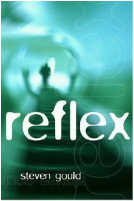Author: Steven Gould
ISBN: 978-0812578546
APA Style Citation
Gould, S. (2005). Reflex. New York, New York: A Tor Book.
Blog Contributor: Joseph Swope, PhD
Institution: Northwest High School
Germantown, Maryland
Website: http://swopepsych.com/
Email: [email protected]
In Gould’s novel, the character David Rice can teleport to anywhere at anytime. He does not know how or why but with barely a thought he can simply “jump” from one place to another, as long as he has been to that destination before. David lives a quiet, prosocial life off the grid with Millie, his clinical psychologist wife. He “jumps” all over the world helping famine relief efforts, our government’s humanitarian efforts, and even the local homeless population.
Of course not, everyone would use such an ability for altruism and social justice. A well-funded paramilitary organization with possible ties to our government kidnaps David. How do you contain someone who can teleport? You condition him to return reflexively to a certain spot. Through masterfully insidious training methods, David learns the only safe place is the “box” his captors have designed for him. Against his will, he finds himself gradually being molded by the conditioning regimen.
With certain aspects of our government not acknowledging that David exists and other aspects competing for his abilities, Millie’s only ally is a homeless woman who was a witness to David’s abduction.
Note: This book is the sequel to the book, Jumper that was made into a movie. This book stands head and should above its prequel, in terms of both the quality of the writing and the depth of the story.
Other Related Resources
Psychological Figures and Concepts
Acquisition
Antipsychotic Medication
Aversive Conditioning
Avoidance Learning
Chaining
Classical Conditioning
Clinical Psychology
Conditioned Response
Conditioned Stimulus
Continuous Reinforcement
Differential Reinforcement
Negative Punishment
Negative Reinforcement
Neutral Stimulus
Positive Punishment
Positive Reinforcement
Shaping
Sleep Deprivation
Successive Approximation
Tardive Dyskinesia
Unconditioned Stimulus
Unconditioned Response

 RSS Feed
RSS Feed